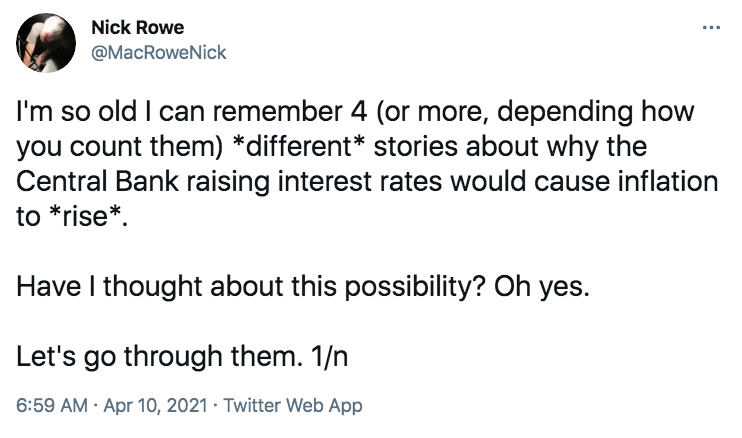Nick Rowe has an excellent twitter thread on interest rates and inflation:

Here I will focus on what I see as the most important parts of his analysis. (I pretty much agree with all his points, but sometimes it’s useful to have ideas reframed in a slightly different fashion.)
So how can we resolve this, and figure out which of those theoretical possibilities is right? 1. Empirically. But CB actions don’t give us a nice RCT. “Friedman’s Thermostat” says targeting inflation is like the *worst possible* experimental design. 18/n
NeoFisherian has a certain appeal because it’s generally true that rising interest rates are associated with rising inflation, and vice versa. In the New Keynesian model this can be explained as follows. When the natural interest rate is rising, the central bank usually raises the policy rate, but more slowly (and vice versa) As a result, the gap between the natural and policy rate widens, which makes monetary policy more expansionary.
The act of raising interest rates is generally a signal of disinflationary intent, but periods of rising interest rates are often inflationary (i.e. the 1960s and 1970s). As an analogy, the act of pressing the accelerator in my car tends to cause acceleration, but during periods when I press hard (going up a steep hill) the car is often slowing down.
If the Japanese suddenly adopt a policy of depreciating the yen at 1%/ month, and also commit to maintain this policy for many decades, the immediate impact will be much higher interest rates in Japan, and double digit inflation. So why is this (NeoFisherian) example not typical of periods where the central bank raises interest rates? Here’s Nick:
But this [NeoFisherian result] requires that everyone interprets the higher r as the CB’s signal of a higher inflation target, plus 100% CB credibility. Nope.
Most central banks use interest rates (not exchange rates) as a policy signal. Raising the interest rate target (fed funds target) is a signal that the central bank intends to take other actions to reduce inflation. (AFAIK, all central banks speak in this language.) Those other actions are either less supply of money (open market sales) or more demand for money (higher IOR or higher reserve requirements.)
Even in cases where the NeoFisherian result holds in the short run, as with the Swiss decision to revalue the franc in January 2011, there were actually two signals sent out. The revaluation led to expectations of lower Swiss inflation. The concurrent cut in Swiss interest rates was a signal intended to make the revaluation smaller, and hence reduce the amount of disinflation. This combined exchange rate/interest rate policy was disinflationary, despite the lower interest rates, but only because the impact of the exchange rate signal dominated.
So here are *my* ultimate things: 1. “Never reason from an interest rate change”. NeoFisherians illustrate one example of how this can go badly wrong. Nominal (even real) interest rates are a bad measure of the tightness/looseness of monetary policy.
That’s also my ultimate thing. Keynesianism is another example of how this can go badly wrong. Not ideal New Keynesianism, but actual, real world Keynesianism. The unfortunate tendency of actual Keynesian economists to assume that when a central bank has been cutting interest rates it has also been making monetary policy more expansionary.
As in 2007-08.
PS. Why does a 1% a month (expected) yen depreciation lead to inflation? Because of PPP. In addition, this announcement would immediately raise Japanese nominal interest rates 12% above US levels due to the interest parity condition. If we assume zero IOR in Japan, then this sort of high nominal interest rate would lead to a flight from the yen, and the Japanese monetary base would quickly fall from 140% of GDP to under 10%. The nominal monetary base would also have to be reduced sharply, in order to avoid even sharper currency depreciation and hyperinflation.
Try to explain that process with MMT!
PPS. Some commenters want me to condemn Biden’s continuation of Trump’s policies of bloated government spending and tariffs on China. OK, I condemn Biden’s economic policies.